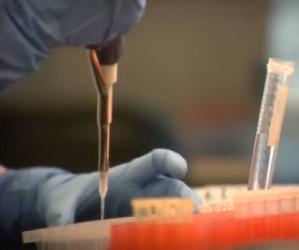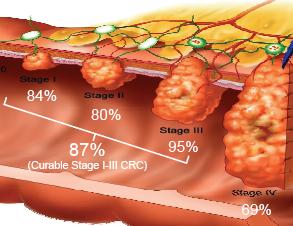
Usually testing for colon cancer involves sticking things up your bum, but the newest tests for the disease are more concerned about what comes out. Exact Sciences (NASDAQ: EXAS) is developing a screening process that analyses stool DNA (sDNA). Cells sloughed off from your colon during a bowel movement end up in your feces, and Exact Sciences can find and test the DNA in those cells to see if any them have become cancerous. Recent studies have shown that Exact Sciences sDNA tests can detect colorectal cancer 85% of the time, and can find precancerous growths (adenomas) 1 cm in size or larger 64% of the time. That’s great news because colorectal cancer is the second deadliest cancer in the US, with more than 50,000 deaths a year. Learn more from the Exact Sciences investor relations video below. These guys may have hit upon the means to get more of us tested, and more lives saved. All we have to do is give a shit.
There are few tests as dreaded as the colonoscopy. Though this screening method for cancer and other colon diseases is very effective (some say more than 90% for colorectal cancer) it is also very unpleasant. A tube has to be inserted, inflated, and then doctors cut out….yeah, let’s just stick with ‘unpleasant’. Colonoscopies are so disliked that many people, even those at high risk for colorectal cancer, simply do not get them performed.

That’s where Exact Sciences comes in. Their sDNA screening method is designed to be as user friendly as it can be – you can even do it in your own home. Collect a grape sized bit of your stool (8g) and send it in to Exact Sciences (actually you should probably wait until they send you a sample collection kit first). Then, Exact Sciences has the DNA in the stool sifted out, amplified and analyzed.
They look for specific proteins and genetic markers, primarily those associated with the K-RAS and APC genes. Methylation markers, mutation markers, hemoglobin markers – these are all flags that a cell has become cancerous. In their validation study (1100+ samples analyzed) Exact Sciences found that they could train their testing methods to get really good results – high 80th percentiles for detecting colon cancer, and mid 50th to low 60th percentiles for precancerous growths. Most impressively, when a patient had a curable level of colorectal cancer (stage 1 to stage 3), Exact Sciences could detect it 87% of the time. That represents thousands and thousands of lives that could be saved.
Others have tried sDNA tests in the past, but the ones used by Exact Sciences are better at amplifying and detecting the right genetic variations. These tests were originally developed by the Mayo Clinic who is licensing the technology to Exact Sciences. They’ve estimated that a standard test using their improved sDNA analysis should cost somewhere between $150-$400. Holy Crap, that’s amazing!
To give you some comparison, colonoscopies retail for ten times as much, and they require the patient to come in to the doctor’s office and get sedated for the test. Then there’s the ‘unpleasantness’ we discussed earlier. True, most insurance companies will cover colonscopies (way cheaper than letting your patient get cancer) but the Exact Sciences test still represents a huge possible savings to the patient. Combined with the relative ease of the test itself (how hard is it to put some poop in a cup?) I think the sDNA based screening method can make a big impact on getting patients tested for colon cancer.
Here’s a video from Exact Sciences about their sDNA tests. Be warned, it’s an investor video, so you may detect some BS.
As explained in the video, Exact Sciences expects to do big business with their sDNA testing methods. This really could be a billion dollar industry, especially as it expands globally. Unfortunately, they are still in the clinical stages for their test, and probably won’t be ready for the FDA approval process until 2012. Hopefully Exact Sciences will continue to have success and move to market as quickly as possible. Their screening methods represent a new generation of DNA based analysis that may change all types of cancer detection in the near future. As these tests become more sophisticated, more accurate, and cheaper, we could make large strides in the ongoing fight against cancer by screening more people more often. Eventually, figuring out whether or not you have cancer will be so easy that we may get tested every day…or at least every time you trigger the smart detection systems in your toilet.
*I would apologize for all the juvenile potty puns in this article, but they were simply too fun to write. Scatalogical science for the win!
[image and video credit: Exact Sciences]
[sources: Exact Sciences, American Cancer Society]


